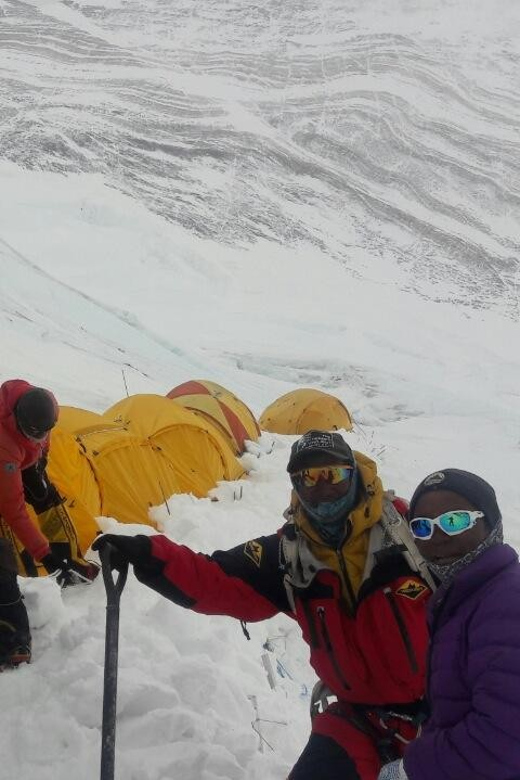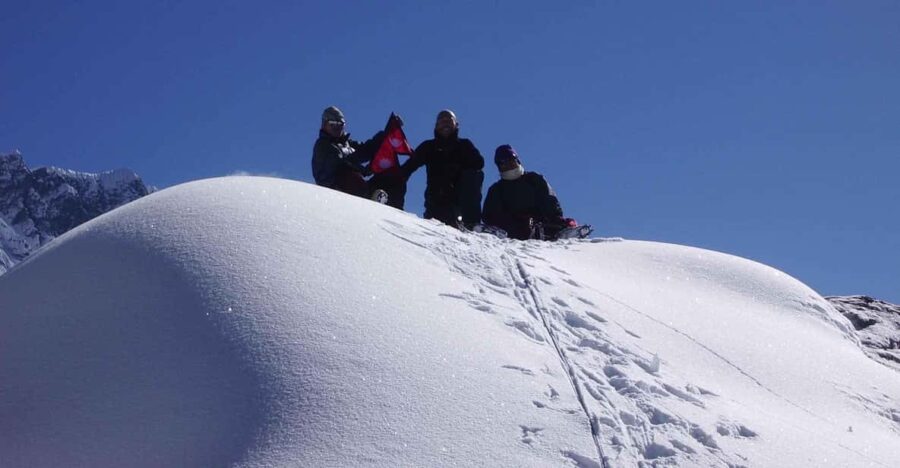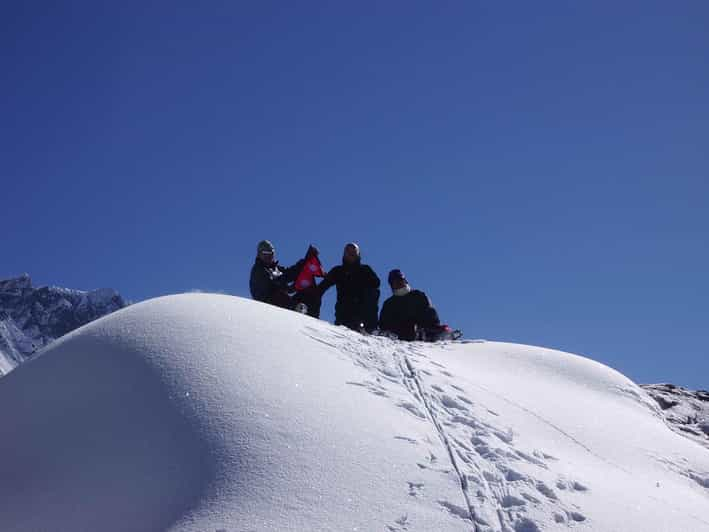Conquering Island Peak, one of the most popular trekking peaks in Nepal, is a thrilling adventure that attracts climbers of all skill levels. Standing tall at 6,189 meters, this Himalayan summit offers a challenging yet rewarding experience amidst the awe-inspiring backdrop of the world’s highest mountain range. From the quaint villages of the Khumbu Valley to the technical sections of the climb, the journey to the top promises breathtaking vistas and an opportunity to test one’s limits. Whether you’re a seasoned mountaineer or a passionate adventurer, the allure of Island Peak is undeniable, beckoning those who seek to push their boundaries and enjoy the grandeur of the Himalayas.
Key Points

- Island Peak, standing at 6,189 meters, offers a moderate yet incredible climbing experience with breathtaking views of the Khumbu Valley and surrounding Himalayan peaks.
- The typical 16-day expedition itinerary includes acclimatization, climbing to the Island Peak Base Camp, and summiting the peak, followed by the return trek to Lukla.
- The climbing package includes full-board services such as permits, accommodations, meals, experienced guides, and all necessary equipment, starting at €1,424.20 per person.
- Participants must be in good physical condition and properly acclimatized to mitigate the risks associated with high altitude, steep terrain, and unpredictable weather.
- Responsible and eco-friendly practices are enforced, including proper waste management and respect for the fragile Himalayan ecosystem.
Himalayan Ascent Overview
Island Peak, also known as Imja Tse, stands out as a prime destination for adventurous climbers seeking a thrilling Himalayan challenge.
Offering breathtaking views of the Khumbu Valley and peaks like Nuptse and Lhotse, this 6,189-meter mountain provides an incredible climbing experience without significant technical difficulty.
Ideal for those looking to push their limits in a spectacular setting, Island Peak‘s ascent promises an unforgettable journey through the heart of the Himalayas.
With its strategic placement and moderate difficulty, the mountain attracts climbers of various skill levels, making it a popular choice for those seeking a true Himalayan adventure.
You can also read our reviews of more tours and experiences in Koshi Zone.
Itinerary and Duration Breakdown

The total duration of the Island Peak climbing expedition typically spans 16 days.
The key itinerary highlights include arriving in Kathmandu, flying to Lukla and trekking to Phakding, and progressing through Namche Bazaar, Tengboche, Dingboche, and Chhukung.
Climbers then acclimatize and climb to the Island Peak Base Camp at 5,200 meters.
The pinnacle of the journey is the summit of Island Peak at 6,189 meters, followed by the return trek to Lukla and the flight back to Kathmandu.
This carefully planned itinerary allows climbers to fully enjoy the breathtaking Himalayan landscape and gradually adapt to the high-altitude environment.
Inclusions in the Package

The climbing package offers a full-board experience, covering the necessary permits, accommodations, and meals during the trek and climb. Climbers will enjoy accommodation in tea houses and base camp, with all meals provided. The package includes experienced trekking and climbing guides, a comprehensive first aid kit, and domestic flight arrangements. All required permits, such as the national park, trekking, and peak climbing permits, are also covered.
| Inclusions | Details |
|---|---|
| Accommodations | Tea houses/lodges during trek and base camp |
| Meals | Breakfast, lunch, dinner, and tea/coffee |
| Permits | National park, trekking, and peak climbing |
| Guides | Experienced trekking and climbing guides |
Cost and Payment Options
For the Island Peak climbing package, the starting price is €1,424.20 per person. Payments can be made with flexible options, and there’s free cancellation up to 24 hours in advance.
Additional costs to consider include:
- International airfare
- Personal expenses
- Travel insurance
- Optional porter services ($260 for 1 porter recommended for 2 trekkers)
The package includes a full-board experience with climbing permits, accommodation, meals, experienced guides, and necessary permits.
Careful planning and preparation are essential, as the trek and climb require proper acclimatization and gear to ensure a safe and memorable adventure.
More Great Thing To Do NearbyHealth and Safety Considerations
Island Peak climbing may not be suitable for everyone. The high altitude, steep terrain, and unpredictable weather conditions make this expedition challenging.
Climbers must be in good physical shape and free of heart, respiratory, or altitude-related issues. Sudden onset of altitude sickness can be dangerous, so proper acclimatization through trekking is essential.
Participants should also avoid smoking, alcohol, and drugs, as these can exacerbate altitude-related problems. Adequate travel insurance covering high-altitude trekking and climbing is a must.
While the rewards of conquering Island Peak are immense, adventurers must carefully consider their fitness and preparedness before embarking on this thrilling journey.
Recommended Gear and Essentials
Climbers embarking on the Island Peak expedition require a comprehensive set of gear and essentials to ensure a safe and successful journey.
Essential items include:
- Warm, layered clothing suitable for the Himalayan climate, including thermal underwear, insulated jackets, and weatherproof outerwear.
- Sturdy, well-broken-in hiking boots with good traction, as well as gaiters to protect against snow and debris.
- High-quality mountaineering equipment like crampons, ice axes, harnesses, and carabiners, along with necessary climbing skills.
Equally important are personal items like sunglasses, sun protection, water bottles, snacks, and a first-aid kit.
Careful packing and preparation are crucial for tackling the challenges of Island Peak.
Environmental Regulations
The expedition organizers place great emphasis on environmental preservation and responsible tourism.
All participants are required to adhere to strict regulations to minimize the impact on the fragile mountain ecosystem. Littering, deforestation, and pollution are strictly prohibited, and proper waste management protocols are enforced. Climbers must use eco-friendly and biodegradable products and pack out all their trash.
Camping is restricted to designated sites, and participants are expected to respect the local culture and wildlife.
Through these measures, the Island Peak climbing experience promotes sustainability and ensures the continued enjoyment of this magnificent natural wonder for future generations.
Preparing for Altitude Acclimation
Proper altitude acclimation is crucial for a successful and safe Island Peak climbing expedition. Climbers must take the necessary steps to prepare their bodies for the high elevations. This includes:
-
Gradually increasing altitude during the trek to allow your body to adapt
-
Staying hydrated and consuming a high-calorie diet to maintain energy levels
-
Allowing for rest days and slow ascent rates to minimize the risk of altitude sickness
Adhering to these principles will help ensure a safer and more enjoyable climb.
Ignoring the importance of acclimatization can result in serious health complications and potentially jeopardize the entire expedition.
Frequently Asked Questions
What Is the Skill Level Required for Island Peak Climbing?
The climb up Island Peak is considered a moderately challenging trek suitable for experienced trekkers and climbers. It requires good physical fitness, basic climbing skills, and prior experience at high altitudes to reach the summit safely.
How Challenging Is the Climb Compared to Other Himalayan Peaks?
The climb up Island Peak is considered a relatively straightforward challenge compared to other Himalayan peaks, suitable for experienced trekkers seeking an adventurous high-altitude expedition without significant technical difficulty.
Can I Climb Island Peak Without Prior Mountaineering Experience?
With proper preparation and guidance from experienced guides, climbers without prior mountaineering experience can attempt Island Peak. However, they’ll need to be physically fit, acclimatize well, and be comfortable with the technical demands of the climb.
What Are the Weather Conditions During the Peak Climbing Season?
The weather during the peak climbing season on Island Peak is generally favorable, with clear skies and moderate temperatures. However, climbers should be prepared for sudden changes, as the Himalayan climate can be unpredictable and may bring snowfall or high winds.
Can I Hire a Porter to Carry My Personal Belongings?
Yes, you can hire a porter to carry your personal belongings during the Island Peak climb. Hiring a porter is recommended, as they’ll cost around $260 for 2 trekkers and can make the trek more manageable.
Recap
Scaling Island Peak offers a thrilling adventure amidst the grandeur of the Himalayas. With proper preparation, trekkers can conquer this challenging peak and revel in the breathtaking vistas. The climb requires a thorough acclimatization process, but the sense of achievement upon reaching the summit is unparalleled. Embarking on this journey provides an opportunity to take in the beauty of the Khumbu Valley and create lasting memories.
You can check if your dates are available here:More Tour Reviews in Koshi Zone
Not for you? Here's more things to do in Koshi Zone we have recnetly reviewed
- 4 Best Tours In Koshi Zone
- 4 Best Helicopter Flights And Tours In Koshi Zone
- 4 Best Hiking And Trekking Tours In Koshi Zone
- Private Luxury Everest View 5 Days Heli Tour
- Everest Base Camp Overnight Stay Trek – 15 Days
- From Lukla: Mera Peak (6,476m) Climbing
- Island Peak (6,189m) Climbing
- Kanchenjunga Circuit Trek – 21 Days
- 19 Days Lobuche East Peak With Everest Base Camp Trek
- Everest Flight – A Journey Above the Himalayas
- MERA PEAK CLIMBING
- Nepal: Kanchenjunga South Base Camp Trek
